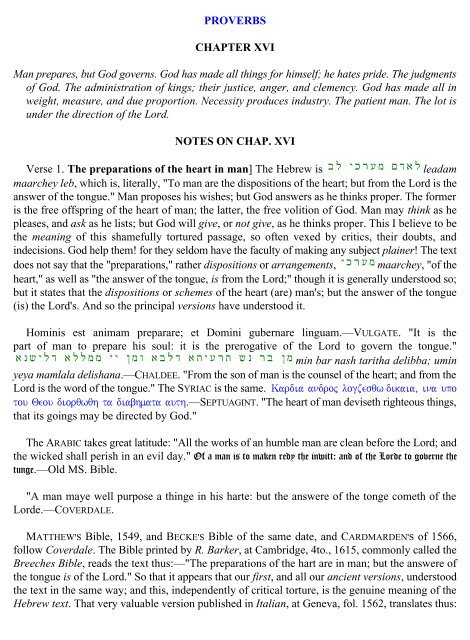Clarke's Commentary - Proverbs - Song Of ... - Media Sabda Org
Clarke's Commentary - Proverbs - Song Of ... - Media Sabda Org
Clarke's Commentary - Proverbs - Song Of ... - Media Sabda Org
You also want an ePaper? Increase the reach of your titles
YUMPU automatically turns print PDFs into web optimized ePapers that Google loves.
PROVERBS<br />
CHAPTER XVI<br />
Man prepares, but God governs. God has made all things for himself; he hates pride. The judgments<br />
of God. The administration of kings; their justice, anger, and clemency. God has made all in<br />
weight, measure, and due proportion. Necessity produces industry. The patient man. The lot is<br />
under the direction of the Lord.<br />
NOTES ON CHAP. XVI<br />
Verse 1. The preparations of the heart in man] The Hebrew is leadam<br />
maarchey leb, which is, literally, "To man are the dispositions of the heart; but from the Lord is the<br />
answer of the tongue." Man proposes his wishes; but God answers as he thinks proper. The former<br />
is the free offspring of the heart of man; the latter, the free volition of God. Man may think as he<br />
pleases, and ask as he lists; but God will give, or not give, as he thinks proper. This I believe to be<br />
the meaning of this shamefully tortured passage, so often vexed by critics, their doubts, and<br />
indecisions. God help them! for they seldom have the faculty of making any subject plainer! The text<br />
does not say that the "preparations," rather dispositions or arrangements, maarchey, "of the<br />
heart," as well as "the answer of the tongue, is from the Lord;" though it is generally understood so;<br />
but it states that the dispositions or schemes of the heart (are) man's; but the answer of the tongue<br />
(is) the Lord's. And so the principal versions have understood it.<br />
Hominis est animam preparare; et Domini gubernare linguam.—VULGATE. "It is the<br />
part of man to prepare his soul: it is the prerogative of the Lord to govern the tongue."<br />
min bar nash taritha delibba; umin<br />
yeya mamlala delishana.—CHALDEE. "From the son of man is the counsel of the heart; and from the<br />
Lord is the word of the tongue." The SYRIAC is the same. %<br />
$ .—SEPTUAGINT. "The heart of man deviseth righteous things,<br />
that its goings may be directed by God."<br />
The ARABIC takes great latitude: "All the works of an humble man are clean before the Lord; and<br />
the wicked shall perish in an evil day." (<br />
.—Old MS. Bible.<br />
"A man maye well purpose a thinge in his harte: but the answere of the tonge cometh of the<br />
Lorde.—COVERDALE.<br />
MATTHEW'S Bible, 1549, and BECKE'S Bible of the same date, and CARDMARDEN'S of 1566,<br />
follow Coverdale. The Bible printed by R. Barker, at Cambridge, 4to., 1615, commonly called the<br />
Breeches Bible, reads the text thus:—"The preparations of the hart are in man; but the answere of<br />
the tongue is of the Lord." So that it appears that our first, and all our ancient versions, understood<br />
the text in the same way; and this, independently of critical torture, is the genuine meaning of the<br />
Hebrew text. That very valuable version published in Italian, at Geneva, fol. 1562, translates thus:
















